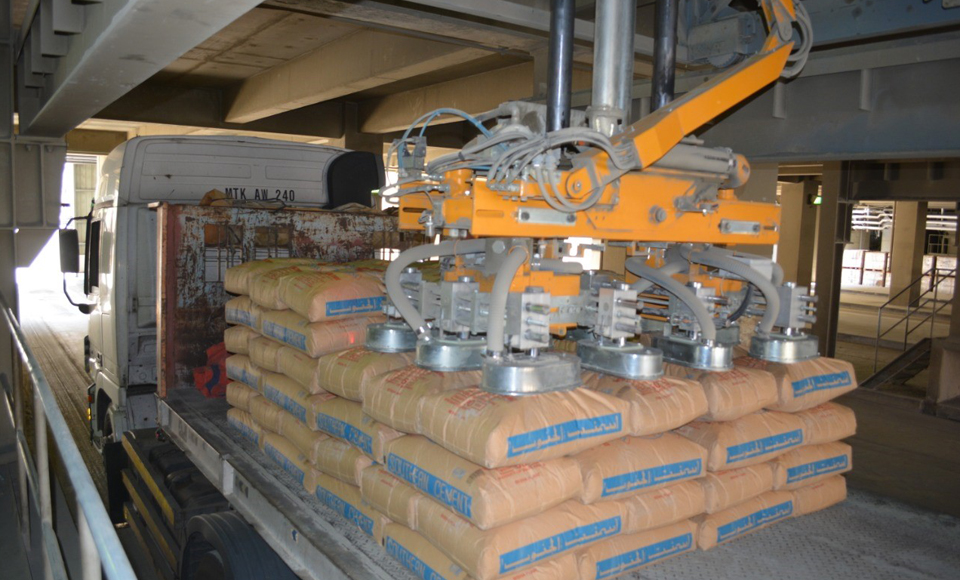MATERIALS SECTOR
Southern Province Cement Company
Cementing Growth

Southern Province Cement Company
- www.spcc.sa
- Year company founded: 1978
- Number of employees: 1,643
- Market capitalization: SAR 11.80 billion
Infrastructure – whether roads, bridges, tunnels, or dams – starts with cement. Huge amounts are required to meet Saudi Arabia’s ambitious development plans and Southern Province Cement Company (SPCC) produces 30,000 tons of clinker and 39,000 tons of cement every day to meet the demand.
SPCC is a joint stock company with 57 percent of its shares owned by the government via the Public Investment Fund, General Organization for Social Insurance and the Public Pension Agency. The company was established in 1978 as a joint stock company and now operates the Jazan, Bisha, and Tahama cement plants. It has played a key role in providing the cement needed for the country’s essential infrastructure, but also in building universities and millions of private sector homes.
Under the leadership of its directors and executive management, SPCC is working closely with government planners to provide the concrete for key projects. It has already proved its ability to meet the requirements of large, high-profile developments including the rebuilding of the two Holy Mosques and Jeddah Airport.
SPCC’s listing on the Saudi Exchange underpins its corporate governance procedures and ensures transparency, integrity with a strong focus on ethics. This has helped attract more investors so that the company can raise capital and spread its wealth more widely. The access to capital, close relationship with government, and a focus on innovation and technology have put the company in a strong position despite industry-wide challenges such as over-production and potential changes in fuel prices.
While the company attracts workers from around the world, it has established institutions and training facilities to give Saudi workers the skills they need. SPCC also works hard to meet the highest environmental and quality standards, including those set by the US and UK, those recently introduced in Saudi Arabia, and Gulf Cooperation Council building material standards.
SPCC is working to increase its use of alternative fuels and reduce pollution and emissions to improve the environment for everyone living in Saudi Arabia.
SPCC started in the 1980s with one plant consisting of two production lines in Jazan province, the first cement factory in the Southern region of Saudi Arabia. It later developed the first cement plant in Assir region, Bisha plant, located on the outskirts of Bisha city. The Bishra plan was inaugurated in 1997 and developed a second line in 2017. The third plant started in Tahama, located in Makkah, in 2004 with one line producing around 5,000 tons of clinker daily. It now features three production lines and produces around 15,000 tons daily.
SPCC’s purpose is to support the local market with one of the most important elements of construction – cement – while fulfilling Vision 2030. That vision guides our day-to-day responsibilities of providing these important materials to our customers.
SPCC has always worked on developing the quality of its products, studying our clients’ needs and solving any problem that might occur. We do so by bringing in new products to meet our clients’ demands and improving the quality of our products to meet local and international standards.
SPCC has been awarded the GSO 1914/2009 for all its factories from the Saudi organization for standardization, metrology, and quality.
SPCC is proud of its track record of innovation, providing the materials for all construction agencies, the government, and the private sector. It is also proud to be able to hire 57 percent of its workforce from the local community and help them develop through education and training.
30,000 tons of clinker and 39,000 tons of cement are produced by SPCC every day

15,000 tonsThe amount of clinker produced by SPCC’s Tahama plant daily
The company considers its people to be one of its most important assets. To sustain its competitive position, SPCC has deployed highly qualified manpower from different countries while attracting qualified Saudi professionals who attend both domestic and internationally recognized training centers.
It is proud of its achievements and its contributions to government projects and private sector housing.
SPCC has been – and will continue to be – on the cutting edge of innovation and transformation as it seeks to meet the expectations of other public and private sector project requirements.
Vision 2030 was developed by the upper economic and industry council headed by his Royal Highness Mohamed Bin Salman.
The vision is a roadmap to progress and innovation that will enable us to prosper economically and industrially among the advanced world players. We are proud of our role in that plan, no matter how small it is.
SPCC is also playing a role in protecting the environment by improving its dust emission controls through new means of pollution and emissions systems, suppressors like filter bags, and other means, all of which will help improve the latest regulated figures. It hopes its efforts will contribute to a better environment for everyone works in – and depends on – extractive quarries.
SPCC believes that maintaining a clean environment in industrial areas is an important responsibility for all industrial companies. To that end, SPCC adopts restricted rules for keeping the environment clean and healthy. The company also conducts frequent analysis in all of its areas of operations to make sure that there is no harmful pollution of any type.
Green cement and other structural steel and carbon composites will require certain types of cement that the company will be working on soon. SPCC is also helping the areas where its plants are located through initiatives to build and financially support projects such as roads, schools, and clinics.
SPCC believes its efforts would not be possible without the Saudi Exchange, which provides a substantial platform to help the company develop and draw the attention of investors in Saudi Arabia and around the world.

